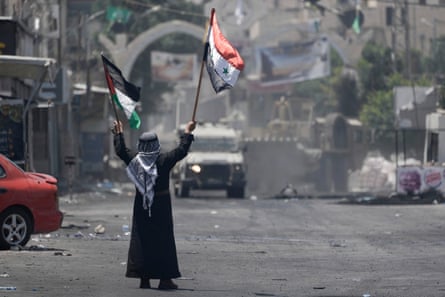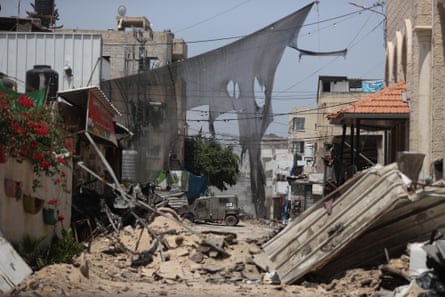In the darkness of the night, thousands of people stumbled in lines through the Jenin refugee camp, guiding each other through the twisted metal, churned-up concrete and spent ammunition littering the narrow streets during a lull in Operation Home and Garden, Israel’s biggest offensive in the West Bank for 20 years.
Videos of the streams of people – about 3,000-4,000, according to Palestinian officials – fleeing to safety on Monday night were widely shared by Palestinians on social media, where they were likened to images of the Nakba, the expulsion of the Arab population from the newly created state of Israel in 1948.
“The neighbours came and told us that the snipers on the rooftops had said that we had two hours to leave, so about 9pm, we went,” said Umm Haitham Al Batawi, 66, waiting at Jenin’s chaotic general hospital on Tuesday.
“They destroyed my home in 2002 also. The children were scared so we left fast, we didn’t take anything with us; I forgot my medicine,” she said.
Ten people have been killed, all of them believed to be involved in the fighting, and dozens of people including civilians injured, according to medics.
Israel’s motives for launching an attack in the West Bank on a scale not seen since the height of the second intifada, or Palestinian uprising, of the 2000s, are widely believed on both sides of the Green Line to be political as much as tactical. There has been growing pressure on the IDF from Israel’s right wing to launch a big operation as a response to the bloodiest year in Israel and the West Bank since 2005: 140 Palestinians and 26 Israelis have been killed so far in 2023.
Israelis living in West Bank settlements, which are illegal under international law, have begun taking matters into their own hands, carrying out rampages on Palestinian villages in revenge for Palestinian shooting and stabbing attacks.
“It’s like Palestinian blood has become a prize every Israeli politician wants. It wins you seats in the Knesset,” said 66-year-old Jihad Hassan, who was looking after his injured son.

The violence on Tuesday spread to Tel Aviv, where a Palestinian attacker in a car ran down and then stabbed people at a bus stop, injuring eight, before he was shot dead. The assailant, 20-year-old Abed al-Wahab Khalaila from Hebron, was claimed as a member by Hamas, the militant group in control of the Gaza Strip.
In Jenin, the boom of explosions and rattle of gunfire echoed around the town for a second day. Many roads into the northern West Bank city were blocked, or studded with impromptu checkpoints at which traffic was stopped for hours. Several vehicles, including an ambulance, instead decided to take an hour-long detour through mountain roads, some unpaved.
The IDF said that the operation was progressing as planned, with more than 120 arrests, the seizure of weapons and explosives and destruction of tunnels, suggesting that the offensive may end in another 24 hours.
On the ground, however, the fighting has not abated. Israeli army vehicles patrolled the town, venturing further than the day before, and bullets and teargas canisters were fired in the direction of the hospital, 200 metres away from the camp’s main entrance.

A 29-year-old fighter who gave his nickname, or kunya, as Abu Ghoul, wearing a white T-shirt covered in dried blood, said his 18-year-old brother – a bomb technician – was killed in the fighting on Monday. Another brother, aged 21, was beaten and arrested. All three were aware they were wanted men.
“They are trying to break the camp’s spirit but it won’t work. I grew up in the second intifada … I have seen everything before, and I am not afraid,” he said.
after newsletter promotion
“They know they can’t stop us. Even in this incursion, they haven’t found what they were looking for, or made that many martyrs. It is getting easier for us to ambush them from tunnels.”
Jenin, along with nearby Nablus, has been the focus of the Israeli Operation Breakwater for more than a year, but the near-nightly raids have not stemmed the worst wave of Palestinian terrorist attacks against Israelis for years.
Home and Garden began with drone strikes and the deployment of at least one battalion of elite troops, aided by snipers and bulldozers, in the early hours of Monday, targeting what the Israel Defence Forces (IDF) said was an important command centre for Palestinian militants.
A new generation of fighters have come of age in the camp amid abject poverty and rampant crime: they do not remember the peace process of the 1990s, or the horrors of the second intifada, and have never had the chance to vote in democratic Palestinian elections. Some have formed their own armed groups, and are only loosely affiliated with the traditional Palestinian factions such as Fatah and Hamas.
Notably absent in Jenin are the Palestinian Authority (PA)’s police and security forces, which many Palestinians now see as little more than subcontractors for the Israeli occupation.
Although Jenin is in Area A, the 18% of the West Bank under full Palestinian control, the PA granted the IDF free rein to operate in Jenin camp during the 2000-05 second intifada. Unable to flush out militants from the camp’s alleyways on its own, the PA has then welcomed Israel’s help in clamping down on armed groups hostile to its authority.
“We are disappointed in the PA. They should be here fighting, defending us, not letting this happen,” said Ali Wishahi, a 36-year-old disabled man at the Jenin hospital entrance.
“They have sent people to hand out water. It’s a joke.”

